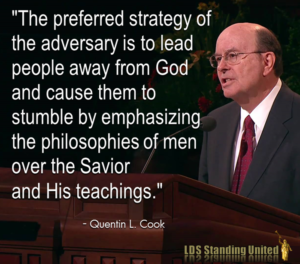
I find it interesting that God designed our physical bodies to need periods of rest. Newborn babies sleep a lot. There is nothing more sweet than a sleeping baby. And older people seem to sleep a lot too – they just aren’t as cute.
God made our earth revolve so that we have a period of darkness – a time conducive to rest. It is like the design of a revolving earth was made to fit the design of mortal bodies that cannot go non-stop for long without fatigue and break down. We have a daily reminder that we need to stop, shut down and rest. Our physical bodies need it. Our minds need it. There is wisdom in having periods of rest.
We all know how hard it is to keep functioning when sleep deprived. We move more slowly and perhaps clumsily. We don’t think as clearly. We can become irritable. If prolonged, a lack of sleep weakens our immune system and we are likely to get sick.
One significant thing about rest, however, is that it is not really restful until after a time of activity – of work. Every Yoga practice session ends with Rest. It is an important – probably the most important – and for many people the hardest part of the workout. We generally lay on the ground in aptly named “corpse pose”. This quiet rest allows our bodies to internalize what we have done and to kind of reset. Yet, without some kind of prior workout – or maybe just the stress of daily life – restful, relaxing yoga is not really that restful.
Too Much of a Needed Thing?
Too much rest is really idleness. Constant idleness makes rest less restful and can actually be fatiguing. I can find myself getting tired on holidays or times of leisure. It can be draining to passively go through life. Sometimes the “rest” we need is more in the way of a change. Sometimes a different kind of work or activity can be as restorative as sleep. This is why we humans recreate. We have hobbies. We go on vacations. We like social events and celebrate special occasions. These are welcome breaks from daily routines.
We are fortunate to live in a time and place where this is recognized with a normal five day work week and a weekend break from that work. Of course, some have different or longer work schedules. Retired people would seem to have perpetual weekends, but many of us even have a regular schedule of “volunteer work”, as well as the tasks of daily living. We have days, or parts of days, committed to others and still look forward to “free time” to do what we find relaxing.
A Day of Rest
God commanded us to rest on the Sabbath Day – His day. The Sabbath was given for our benefit as a period of rest. But one day of doing nothing will do nothing to restore us, either physically, mentally or spiritually. The rest intended is a rest from the world – from our daily worldly tasks, and from worldly activities that keep us from God. We shift our focus to spiritual things and worship God.
There is still work to be done on the Sabbath, but it is a different and better work – God’s work. We serve God by serving others – attending more to spiritual and emotional needs. Sometimes such work can fill our day, leaving little time for idleness and maybe even leaving us tired. But shifting our focus from ourselves for one day does much to restore our souls. When charity fuels our service to others, it also refreshes us.
My Blog Rest
I have been blogging for over three years now. Two years ago I started to write a “Word of the Month” . The idea was to focus on a particular word each month and write some of my thoughts about it. I made a commitment to myself to do this, which I take very seriously. It has been a challenge in the past for me to let go of something I have committed to, even though it does not seem to be working out well.
I started the “Word of the Month” about the same time I created a Facebook Page for my blog. My hope was to generate some thoughtful discussion about ideas related to these words. Though I appreciate the kind comments some of my posts have generated, the type of discussions I hoped for have not happened. I now have an archive of 25 posts consisting of my thoughts about 25 words. These will remain for future reference and potential discussion.
Interestingly there seems to be more interest in my genealogy blog, EgglestonRoots. At this time, I feel I should be spending more time getting genealogical information posted there. (I also did the same thing to myself there – deciding to write biography posts on ancestor’s birthdays – and have already had to scale back my commitment.)
I will continue to blog, writing Starkside blog posts when I feel impressed to speak out about something important to me. I will just not be holding myself to a schedule where I feel I must select some word and get something written and ready to post by the first of the next month. If the “Word of the Month” is something I began, it is something I can end. Or at least take a rest from for a time.














